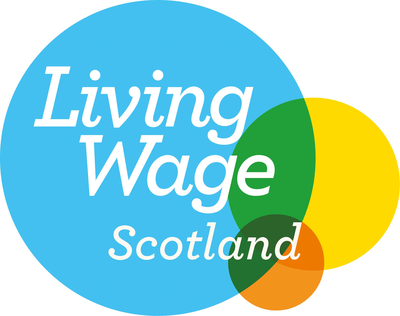By Muireann O’Sullivan, Living Wage Project Assistant
June is Pride Month. Pride Month is rooted in the struggle of the LGBT+ community for equality and justice. It is a month to celebrate and reflect on the progress of the LGBT+ movement and look into the future to create a better world for all LGBT+ people. This month we spoke to LGBT+ organisations in Scotland that pay the real Living Wage and investigate how fair pay is linked to the health and well-being of LGBT+ people in work.
Despite substantial advancements in LGBT+ rights to date, the experiences of LGBT+ individuals in the workforce continue to reflect the work that needs to be done to achieve true equality. Research across the UK demonstrates that members of the LGBT+ community often experience lower earnings compared to their heterosexual and cisgender counterparts. LGBT+ Youth Charity Just Like Us found that 24% of LGBT+ young adults (aged 18-25) make less than £19,999 per year, compared to 16% of non-LGBT+ young adults.[1] For comparison, a full-time worker earning the real Living Wage could earn around £21.255 per year. The National LGBT Survey carried out in 2018 found that 47% of LGBT+ people in the sample earned less than £20k annually.[2] These economic inequalities are due to various factors including workplace discrimination, employment barriers, and limited job opportunities. There is a lack of official data on the issue of an LGBT+ pay gap, making this data not comparable to other pay gaps.
Financial insecurity and insecure work have been consistently linked to an increased risk or poorer mental and physical health. This is particularly true in a cost-of-living crisis. Research published in September 2022 showed that low-paid workers were increasingly more likely to skip meals regularly than at the start of the year. 69% of low-paid workers noted that the pay they receive has an adverse effect on their quality of life and their anxiety levels.[3] LGBT+ individuals already face increased rates of mental health issues due to societal stigma and discrimination in all aspects of their lives. Most of the community worries about their finances at least some of the time.[4]
In our engagement with employers during Pride Month, there is evidence of values-driven decisions, where commitment to the real Living Wage is an example of employers acting on an issue that can help address the low pay prevalent in the LGBT+ community.
“We pay the real living wage because at our core we care about what is right. LGBT Health and Wellbeing is able to support so many because we truly care about all the people that come to us for help and community. So, it is important that we make sure that everybody gets paid properly for the meaningful work they do. Ensuring that we pay the real Living Wage is something that we feel strongly about so we can make sure that our staff are able to continue doing a job that they love that allows them to be their authentic selves.”
Maria Power, People Support Co-ordinator, LGBT Health and Wellbeing
The real Living Wage provides a foundation for economic security, reducing stress and anxiety related to financial struggles. When LGBT+ individuals can meet their basic needs, it positively impacts their mental well-being, allowing them to focus on personal growth, career development, and overall happiness. Both the Living Wage campaign and LGBT Pride are both committed to building a more just society. Paying the real Living Wage reinforces the values of inclusivity and diversity which are the core of the LGBT+ movement.
“At the core of our purpose, LEAP Sports works for equality and social justice. We strongly believe that we can’t pursue these aims without also doing all that we can to ensure that our own most valuable assets – our people – have the best terms that we can achieve, and a commitment to the real Living Wage is an essential part of that. As a lived experience organisation, we are familiar with being asked to give for free, and it’s important to us not to perpetuate that in our own practice.”
Hugh Torrance, Executive Director, LEAP Sports Scotland
Tackling low pay is just one part of the action needed to address the pervasive low pay and insecure work that the LGBT+ community faces but is an important part. Our work directly with employers will continue to make sure as many workers as possible receive at least the real Living Wage.
If you’re an employer who wants to do something to take action for equality and commit to paying all your workers a fair day’s part for a hard day’s work, you could start by becoming Living Wage accredited. To talk to us about how to become accredited, and the benefits of being a Living Wage employer, please get in touch with us by emailing accreditation@povertyalliance.org.
[1] https://www.justlikeus.org/blog/2023/04/12/lgbt-work-jobs/
[2] https://www.gov.uk/government/publications/national-lgbt-survey-summary-report
[3] Life on Low Pay Living Wage Foundation https://www.livingwage.org.uk/life-low-pay-during-cost-living-crisis
[4] https://www.lgbthealth.org.uk/news/health-needs-assessment-lgbt-scotland/#:~:text=Trans%20and%20non%2Dbinary%20people,and%20bisexual%20women%20(61%25).
